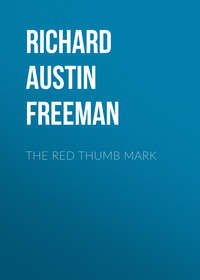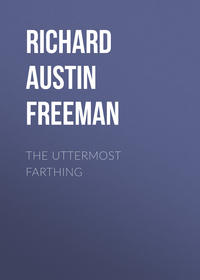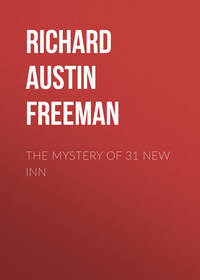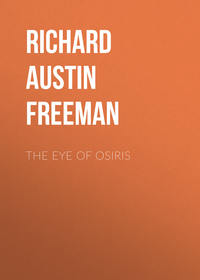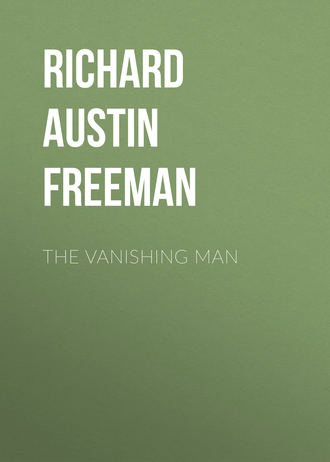 полная версия
полная версияThe Vanishing Man
"Not at all," was the hearty response. "I'm delighted to hear that you sent him off; he wanted a holiday, poor man. And I am delighted to make your acquaintance, too."
"It is very good of you," I said; whereupon he bowed as gracefully as a man may who is propped up in bed with a heap of pillows; and having thus exchanged broadsides of civility, so to speak, we—or, at least, I—proceeded to business.
"How long have you been laid up?" I asked cautiously, not wishing to make too evident the fact that my principal had given me no information respecting his case.
"A week to-day," he replied. "The fons et origo mali was a hansom-cab which upset me opposite the Law Courts—sent me sprawling in the middle of the road. My own fault, of course—at least, the cabby said so, and I suppose he knew. But that was no consolation to me."
"Were you much hurt?"
"No, not really; but the fall bruised my knee rather badly and gave me a deuce of a shake up. I'm too old for that sort of thing, you know."
"Most people are," said I.
"True; but you can take a cropper more gracefully at twenty than at fifty-five. However, the knee is getting on quite well—you shall see it presently—and you observe that I am giving it complete rest. But that isn't the whole of the trouble or the worst of it. It's my confounded nerves. I'm as irritable as the devil and as nervous as a cat, and I can't get a decent night's rest."
I recalled the tremulous hand that he had offered me. He did not look like a drinker, but still—
"Do you smoke much?" I inquired diplomatically.
He looked at me slyly and chuckled. "That's a very delicate way to approach the subject, Doctor," he said. "No, I don't smoke much, and I don't crook my little finger. I saw you look at my shaky hand just now—oh, it's all right; I'm not offended. It's a doctor's business to keep his eyelids lifting. But my hand is steady enough as a rule, when I'm not upset, but the least excitement sets me shaking like a jelly. And the fact is that I have just had a deucedly unpleasant interview—"
"I think," Miss Bellingham interrupted, "Doctor Berkeley and, in fact, the neighbourhood at large, are aware of the fact."
Mr. Bellingham laughed rather shamefacedly. "I'm afraid I did lose my temper," he said; "but I am an impulsive old fellow, Doctor, and when I'm put out I'm apt to speak my mind—a little too bluntly, perhaps."
"And audibly," his daughter added. "Do you know that Doctor Berkeley was reduced to the necessity of stopping his ears?" She glanced at me, as she spoke, with something like a twinkle in her solemn grey eyes.
"Did I shout?" Mr. Bellingham asked, not very contritely, I thought, though he added: "I'm very sorry, my dear; but it won't happen again. I think we've seen the last of that good gentleman."
"I am sure I hope so," she rejoined, adding: "And now I will leave you to your talk; I shall be in the next room if you should want me."
I opened the door for her, and when she had passed out with a stiff little bow I seated myself by the bedside and resumed the consultation. It was evidently a case of nervous breakdown, to which the cab accident had, no doubt, contributed. As to the other antecedents, they were no concern of mine, though Mr. Bellingham seemed to think otherwise, for he resumed: "That cab business was the last straw, you know, and it finished me off, but I have been going down the hill for a long time. I've had a lot of trouble during the last two years. But I suppose I oughtn't to pester you with the details of my personal affairs."
"Anything that bears on your present state of health is of interest to me if you don't mind telling it," I said.
"Mind!" he exclaimed. "Did you ever meet an invalid who didn't enjoy talking about his own health? It's the listener who minds, as a rule."
"Well, the present listener doesn't," I said.
"Then," said Mr. Bellingham, "I'll treat myself to the luxury of telling you all my troubles; I don't often get the chance of a confidential grumble to a responsible man of my own class. And I really have some excuse for railing at Fortune, as you will agree when I tell you that, a couple of years ago, I went to bed one night a gentleman of independent means and excellent prospects and woke up in the morning to find myself practically a beggar. Not a cheerful experience that, you know, at my time of life, eh?"
"No," I agreed, "nor at any other."
"And that was not all," he continued; "for, at the same moment, I lost my only brother, my dearest, kindest friend. He disappeared—vanished off the face of the earth; but perhaps you have heard of the affair. The confounded papers were full of it at the time."
He paused abruptly, noticing, no doubt, a sudden change in my face. Of course, I recollected the case now. Indeed, ever since I had entered the house some chord of memory had been faintly vibrating, and now his last words had struck out the full note.
"Yes," I said, "I remember the incident, though I don't suppose I should but for the fact that our lecturer on medical jurisprudence drew my attention to it."
"Indeed," said Mr. Bellingham, rather uneasily, as I fancied. "What did he say about it?"
"He referred to it as a case that was calculated to give rise to some very pretty legal complications."
"By Jove!" exclaimed Mr. Bellingham, "that man was a prophet! Legal complications, indeed! But I'll be bound he never guessed at the sort of infernal tangle that has actually gathered round the affair. By the way, what was his name?"
"Thorndyke," I replied. "Doctor John Thorndyke."
"Thorndyke," Mr. Bellingham repeated in a musing, retrospective tone. "I seem to remember that name. Yes, of course. I have heard a legal friend of mine, a Mr. Marchmont, speak of him in reference to the case of a man whom I knew slightly years ago—a certain Jeffrey Blackmore, who also disappeared very mysteriously. I remember now that Doctor Thorndyke unravelled that case with most remarkable ingenuity."
"I daresay he would be very much interested to hear about your case," I suggested.
"I daresay he would," was the reply; "but one can't take up a professional man's time for nothing, and I couldn't afford to pay him. And that reminds me that I'm taking up your time by gossiping about my purely personal affairs."
"My morning round is finished," said I, "and, moreover, your personal affairs are highly interesting. I suppose I mustn't ask what is the nature of the legal entanglement?"
"Not unless you are prepared to stay here for the rest of the day and go home a raving lunatic. But I'll tell you this much: the trouble is about my poor brother's will. In the first place, it can't be administered because there is no sufficient evidence that my brother is dead; and in the second place, if it could, all the property would go to people who were never intended to benefit. The will itself is the most diabolically exasperating document that was ever produced by the perverted ingenuity of a wrong-headed man. That's all. Will you have a look at my knee?"
As Mr. Bellingham's explanation (delivered in a rapid crescendo and ending almost in a shout) had left him purple-faced and trembling, I thought it best to bring our talk to an end. Accordingly I proceeded to inspect the injured knee, which was now nearly well, and to overhaul my patient generally; and having given him detailed instructions as to his general conduct, I rose to take my leave.
"And remember," I said as I shook his hand, "no tobacco, no coffee, no excitement of any kind. Lead a quiet, bovine life."
"That's all very well," he grumbled, "but supposing people come here and excite me?"
"Disregard them," said I, "and read Whitaker's Almanack." And with this parting advice I passed out into the other room.
Miss Bellingham was seated at the table with a pile of blue-covered note-books before her, two of which were open, displaying pages closely written in a small, neat handwriting. She rose as I entered and looked at me inquiringly.
"I heard you advising my father to read Whitaker's Almanack," she said. "Was that as a curative measure?"
"Entirely," I replied. "I recommended it for its medicinal virtues, as an antidote to mental excitement."
She smiled faintly. "It certainly is not a highly emotional book," she said, and then asked: "Have you any other instructions to give?"
"Well, I might give the conventional advice—to maintain a cheerful outlook and avoid worry; but I don't suppose you would find it very helpful."
"No," she answered bitterly; "it is a counsel of perfection. People in our position are not a very cheerful class, I am afraid; but still they don't seek out worries from sheer perverseness. The worries come unsought. But, of course, you can't enter into that."
"I can't give any practical help, I fear, though I do sincerely hope that your father's affairs will straighten themselves out soon."
She thanked me for my good wishes and accompanied me down to the street door, where, with a bow and a rather stiff handshake, she gave me my congé.
Very ungratefully the noise of Fetter Lane smote on my ears as I came out through the archway, and very squalid and unrestful the little street looked when contrasted with the dignity and monastic quiet of the old garden. As to the surgery, with its oilcloth floor and walls made hideous with gaudy insurance show-cards in sham gilt frames, its aspect was so revolting that I flew to the day-book for distraction, and was still busily entering the morning's visits when the bottle-boy, Adolphus, entered stealthily to announce lunch.
CHAPTER III
JOHN THORNDYKEThat the character of an individual tends to be reflected in his dress is a fact familiar to the least observant. That the observation is equally applicable to aggregates of men is less familiar, but equally true. Do not the members of the fighting professions, even to this day, deck themselves in feathers, in gaudy colours and gilded ornaments, after the manner of the African war-chief or the "Redskin brave," and thereby indicate the place of war in modern civilisation? Does not the Church of Rome send her priests to the altar in habiliments that were fashionable before the fall of the Roman Empire, in token of her immovable conservatism? And, lastly, does not the Law, lumbering on in the wake of progress, symbolise its subjection to precedent by head-gear reminiscent of the days of good Queen Anne?
I should apologise for obtruding upon the reader these somewhat trite reflections; which were set going by the quaint stock-in-trade of the wig-maker's shop in the cloisters of the Inner Temple, whither I had strayed on a sultry afternoon in quest of shade and quiet. I had halted opposite the little shop window, and, with my eyes bent dreamily on the row of wigs, was pursuing the above train of thought when I was startled by a deep voice saying softly in my ear: "I'd have the full-bottomed one if I were you."
I turned swiftly and rather fiercely, and looked into the face of my old friend and fellow-student, Jervis, behind whom, regarding us with a sedate smile, stood my former teacher, Dr. John Thorndyke. Both men greeted me with a warmth that I felt to be very flattering, for Thorndyke was quite a great personage, and even Jervis was several years my academic senior.
"You are coming in to have a cup of tea with us, I hope," said Thorndyke; and as I assented gladly, he took my arm and led me across the court in the direction of the Treasury.
"But why that hungry gaze at those forensic vanities, Berkeley?" he asked. "Are you thinking of following my example and Jervis's—deserting the bedside for the Bar?"
"What! Has Jervis gone into the law?" I exclaimed.
"Bless you, yes!" replied Jervis. "I have become parasitical on Thorndyke! 'The big fleas have little fleas,' you know. I am the additional fraction trailing after the whole number in the rear of a decimal point."
"Don't you believe him, Berkeley," interposed Thorndyke. "He is the brains of the firm. I supply the respectability and moral worth. But you haven't answered my question. What are you doing here on a summer afternoon staring into a wigmaker's window?"
"I am Barnard's locum; he is in practice in Fetter Lane."
"I know," said Thorndyke; "we meet him occasionally, and very pale and peaky he has been looking of late. Is he taking a holiday?"
"Yes. He has gone for a trip to the Isles of Greece in a currant ship."
"Then," said Jervis, "you are actually a local G.P. I thought you were looking beastly respectable."
"And, judging from your leisured manner when we encountered you," added Thorndyke, "the practice is not a strenuous one. I suppose it is entirely local?"
"Yes," I replied. "The patients mostly live in the small streets and courts within a half-mile radius of the surgery, and the abodes of some of them are pretty squalid. Oh! and that reminds me of a very strange coincidence. It will interest you, I think."
"Life is made up of strange coincidences," said Thorndyke. "Nobody but a reviewer of novels is ever really surprised at a coincidence. But what is yours?"
"It is connected with a case that you mentioned to us at the hospital about two years ago, the case of a man who disappeared under rather mysterious circumstances. Do you remember it? The man's name was Bellingham."
"The Egyptologist? Yes, I remember the case quite well. What about it?"
"The brother is a patient of mine. He is living in Nevill's Court with his daughter, and they seem to be as poor as church mice."
"Really," said Thorndyke, "this is quite interesting. They must have come down in the world rather suddenly. If I remember rightly, the brother was living in a house of some pretensions standing in its own grounds."
"Yes, that is so. I see you recollect all about the case."
"My dear fellow," said Jervis, "Thorndyke never forgets a likely case. He is a sort of medico-legal camel. He gulps down the raw facts from the newspapers or elsewhere, and then, in his leisure moments, he calmly regurgitates them and has a quiet chew at them. It is a quaint habit. A case crops up in the papers or in one of the courts, and Thorndyke swallows it whole. Then it lapses and everyone forgets it. A year or two later it crops up in a new form, and, to your astonishment, you find that Thorndyke has got it all cut and dried. He has been ruminating on it periodically in the interval."
"You notice," said Thorndyke, "that my learned friend is pleased to indulge in mixed metaphors. But his statement is substantially true, though obscurely worded. You must tell us more about the Bellinghams when we have fortified you with a cup of tea."
Our talk had brought us to Thorndyke's chambers, which were on the first floor of No. 5A King's Bench Walk, and as we entered the fine, spacious, panelled room we found a small, elderly man, neatly dressed in black, setting out the tea-service on the table. I glanced at him with some curiosity. He hardly looked like a servant, in spite of his neat, black clothes; in fact, his appearance was rather puzzling, for while his quiet dignity and his serious, intelligent face suggested some kind of professional man, his neat, capable hands were those of a skilled mechanic.
Thorndyke surveyed the tea-tray thoughtfully and then looked at his retainer. "I see you have put three tea-cups, Polton," he said. "Now, how did you know I was bringing someone in to tea?"
The little man smiled a quaint, crinkly smile of gratification as he explained:
"I happened to look out of the laboratory window as you turned the corner, sir."
"How disappointingly simple," said Jervis. "We were hoping for something abstruse and telepathic."
"Simplicity is the soul of efficiency, sir," replied Polton as he checked the tea-service to make sure that nothing was forgotten, and with this remarkable aphorism he silently evaporated.
"To return to the Bellingham case," said Thorndyke, when he had poured out the tea. "Have you picked up any facts relating to the parties—any facts, I mean, of course, that it would be proper for you to mention?"
"I have learned one or two things that there is no harm in repeating. For instance, I gather that Godfrey Bellingham—my patient—lost all his property quite suddenly about the time of the disappearance."
"That is really odd," said Thorndyke. "The opposite condition would be quite understandable, but one doesn't see exactly how this can have happened, unless there was an allowance of some sort."
"No, that was what struck me. But there seem to be some queer features in the case, and the legal position is evidently getting complicated. There is a will, for example, which is giving trouble."
"They will hardly be able to administer the will without either proof or presumption of death," Thorndyke remarked.
"Exactly. That's one of the difficulties. Another is that there seems to be some fatal defect in the drafting of the will itself. I don't know what it is, but I expect I shall hear sooner or later. By the way, I mentioned the interest that you had taken in the case, and I think Bellingham would have liked to consult you, but, of course, the poor devil has no money."
"That is awkward for him if the other interested parties have. There will probably be legal proceedings of some kind, and as the law takes no account of poverty, he is likely to go to the wall. He ought to have advice of some sort."
"I don't see how he is to get it," said I.
"Neither do I," Thorndyke admitted. "There are no hospitals for impecunious litigants; it is assumed that only persons of means have a right to go to law. Of course, if we knew the man and the circumstances we might be able to help him; but, for all we know to the contrary, he may be an arrant scoundrel."
I recalled the strange conversation that I had overheard, and wondered what Thorndyke would have thought of it if it had been allowable for me to repeat it. Obviously it was not, however, and I could only give my own impressions.
"He doesn't strike me as that," I said; "but, of course, one never knows. Personally, he impressed me rather favourably, which is more than the other man did."
"What other man?" asked Thorndyke.
"There was another man in the case, wasn't there? I forget his name. I saw him at the house and didn't much like the look of him. I suspect he's putting some sort of pressure on Bellingham."
"Berkeley knows more about this than he is telling us," said Jervis. "Let us look up the report and see who this stranger is." He took down from a shelf a large volume of newspaper-cuttings and laid it on the table.
"You see," said he, as he ran his finger down the index, "Thorndyke files all the cases that are likely to come to something, and I know he had expectations respecting this one. I fancy he had some ghoulish hope that the missing gentleman's head might turn up in somebody's dust-bin. Here we are; the other man's name is Hurst. He is apparently a cousin, and it was at his house that the missing man was last seen alive."
"So you think Mr. Hurst is moving in the matter?" said Thorndyke, when he had glanced over the report.
"That is my impression," I replied, "though I really know nothing about it."
"Well," said Thorndyke, "if you should learn what is being done and should have permission to speak of it, I shall be very interested to hear how the case progresses; and if an unofficial opinion on any point would be of service, I think there would be no harm in my giving it."
"It would certainly be of great value if the other parties are taking professional advice," I said; and then, after a pause, I asked: "Have you given this case much consideration?"
Thorndyke reflected. "No," he said, "I can't say that I have. I turned it over rather carefully when the report first appeared, and I have speculated on it occasionally since. It is my habit, as Jervis was telling you, to utilise odd moments of leisure (such as a railway journey, for instance) by constructing theories to account for the facts of such obscure cases as have come to my notice. It is a useful habit, I think, for, apart from the mental exercise and experience that one gains from it, an appreciable proportion of these cases ultimately come into my hands, and then the previous consideration of them is so much time gained."
"Have you formed any theory to account for the facts in this case?" I asked.
"Yes; I have several theories, one of which I especially favour, and I am waiting with great interest such new facts as may indicate to me which of these theories is probably the correct one."
"It's no use your trying to pump him, Berkeley," said Jervis. "He is fitted with an information-valve that opens inwards. You can pour in as much as you like, but you can't get any out."
Thorndyke chuckled. "My learned friend is, in the main, correct," he said. "You see, I may be called upon any day to advise on this case, in which event I should feel remarkably foolish if I had already expounded my views in detail. But I should like to hear what you and Jervis make of the case as reported in the newspapers."
"There now," exclaimed Jervis, "what did I tell you? He wants to suck our brains."
"As far as my brain is concerned," I said, "the process of suction isn't likely to yield much except a vacuum, so I will resign in favour of you. You are a full-blown lawyer, whereas I am only a simple G.P."
Jervis filled his pipe with deliberate care and lighted it. Then, blowing a slender stream of smoke into the air, he said:
"If you want to know what I make of the case from that report, I can tell you in one word—nothing. Every road seems to end in a cul-de-sac."
"Oh, come!" said Thorndyke, "this is mere laziness. Berkeley wants to witness a display of your forensic wisdom. A learned counsel may be in a fog—he very often is—but he doesn't state the fact baldly; he wraps it up in a decent verbal disguise. Tell us how you arrive at your conclusion. Show us that you have really weighed the facts."
"Very well," said Jervis, "I will give you a masterly analysis of the case—leading to nothing." He continued to puff at his pipe for a time with slight embarrassment, as I thought—and I fully sympathised with him. Finally he blew a little cloud and commenced:
"The position appears to be this: Here is a man who is seen to enter a certain house, who is shown into a certain room and shut in. He is not seen to come out, and yet, when the room is next entered, it is found to be empty; and that man is never seen again, alive or dead. That is a pretty tough beginning.
"Now, it is evident that one of three things must have happened. Either he must have remained in that room, or at least in that house, alive; or he must have died, naturally or otherwise, and his body have been concealed; or he must have left the house unobserved. Let us take the first case. This affair happened nearly two years ago. Now, he couldn't have remained alive in the house for two years. He would have been noticed. The servants, for instance, when cleaning out the rooms, would have observed him."
Here Thorndyke interposed with an indulgent smile at his junior: "My learned friend is treating the inquiry with unbecoming levity. We accept the conclusion that the man did not remain in the house alive."
"Very well. Then did he remain in it dead? Apparently not. The report says that as soon as the man was missed, Hurst and the servants together searched the house thoroughly. But there had been no time or opportunity to dispose of the body, whence the only possible conclusion is that the body was not there. Moreover, if we admit the possibility of his having been murdered—for that is what concealment of the body would imply—there is the question: Who could have murdered him? Not the servants, obviously, and as to Hurst—well, of course, we don't know what his relations with the missing man have been—at least, I don't."
"Neither do I," said Thorndyke. "I know nothing beyond what is in the newspaper report and what Berkeley has told us."
"Then we know nothing. He may have had a motive for murdering the man or he may not. The point is that he doesn't seem to have had the opportunity. Even if we suppose that he managed to conceal the body temporarily, still there was the final disposal of it. He couldn't have buried it in the garden with the servants about; neither could he have burned it. The only conceivable method by which he could have got rid of it would have been that of cutting it up into fragments and burying the dismembered parts in some secluded spots or dropping them into ponds or rivers. But no remains of the kind have been found, as some of them probably would have been by now, so that there is nothing to support this suggestion; indeed, the idea of murder, in this house at least, seems to be excluded by the search that was made the instant the man was missed.


